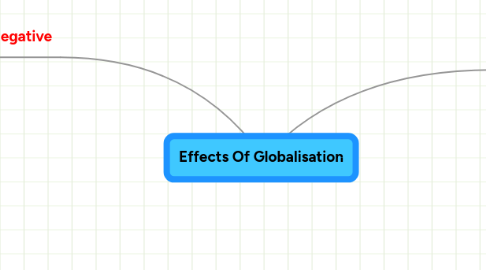
1. Negative
1.1. Economy
1.1.1. Trade
1.1.1.1. When large economies are affected, the effects are felt all over the world
1.1.1.1.1. Trade decreases, domestic jobs and businesses are lost.
1.1.2. Increased competition among countries
1.1.2.1. TNCs will seek out locations which could help them lower their cost of production
1.1.2.1.1. Thus countries will compete with one another to attract these corporations to invest in their countries.
1.1.3. Development
1.1.3.1. Widening gap between the rich and the poor
1.1.3.1.1. Eurasian landmass is oriented east-west, much of its area lies in the same climatic region
1.1.4. Disrupt traditional producers
1.1.4.1. Globalisation threatens the viability of locally made products and the people who produce them
1.1.4.1.1. E.g The new availability of foreign foods in a market—often at cheaper prices—can displace local farmers who have traditionally earned a living by selling their goods locally.
1.2. Social
1.2.1. Loss of local culture
1.2.1.1. Global brands such as Starbucks and Disney dominate the consumer market in many developing countries
1.2.1.1.1. These corporations have standardised methods of operations and have outlets which are identical throughout the world
1.2.2. Loss of talent
1.2.2.1. People who are highly skilled are in demand
1.2.2.1.1. Countries suffer the loss of trained and educated individuals to emigration
1.3. Environment Degradation
1.3.1. Uncontrolled economic growth, fueled by free trade, harms the environment by causing more pollution and exhaustion of natural resources like timber and oil
1.3.1.1. Corporations started to produce more and more, because people started to ask for more
1.3.1.1.1. To produce the most in the shortest amount of time, the factories would have to break the environmental regulations
1.4. Health
1.4.1. More people travel farther, more frequently, and come in contact with more people and goods, than at any point in history.
1.4.1.1. This increased movement of both goods and people increases opportunities for the spread of disease around the world
1.4.1.1.1. The outbreak of BSE, or “mad cow disease,” in several European countries is only one example
2. Positive
2.1. Economy
2.1.1. Improvement in the standard of living
2.1.1.1. Many globalising countries have enjoyed an increase in the number in income levels
2.1.1.1.1. When countries and open their doors to foreign investments, they earn more revenue
2.1.2. Benefits from mitigration
2.1.2.1. Short-term economic benefit of emigration is remittances
2.1.2.1.1. E.g. Somaliland,receives an estimated $500 million a year in money sent home from abroad, four times more than the income from the main export, livestock, according to a study by the researcher Ismail Ahmed reported in the Financial Times
2.1.2.2. Provides the country with cheap labour
2.1.3. Opportunites for the talented
2.1.3.1. People are able to move more easily from country to country in search of employment and leisure activities
2.2. Health
2.2.1. Improve access to the medicines, medical information, and training that can help treat or cure these diseases
2.2.1.1. Drug companies and governments now have the ability to ship drugs to remote parts of the world affected by outbreaks of disease
2.3. Social
2.3.1. Though globalisation,people have become more aware of the different cultures.
2.3.1.1. They are able to learn about other people around the world through the internet .travelling etc
2.4. Trade
2.4.1. Increase the availability of foreign-made consumer products
2.4.1.1. Also increase international trade in cultural products and services, such as movies, music, and publications
2.5. Environment
2.5.1. Brought about greater awareness of environmental management
2.5.1.1. Countries want to preserve the environment in order to ensure that the future generations can continue to use the earth's resources to generate income and continue enjoying high standards of living
2.6. Increased standard of living
2.6.1. Globalized economies require a labor force of a size that must include women
2.6.1.1. Globalisation breaks down cultural barriers, especially in the relationship between women and men within households and communities, impede increased economic participation, or undermine the quality of that participation
2.6.1.1.1. E.g.Even women who do work face differential treatment such as wage gaps and segregation into traditionally female industries.
